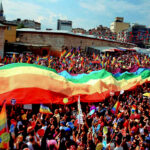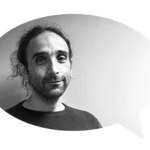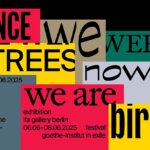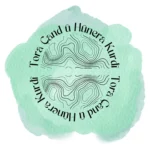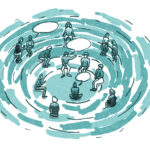Overview
This course proposes an inquiry into the academic and cultural experiences of writing and rewriting history in Palestine and in Syria. It combines different approaches and intellectual schools from the epistemic question of “decolonizing” knowledge to the impact of today’s information revolution as a factor in cultural production and political representations.
The course emphasizes transdisciplinary discussions on the nature of conflicts and their features. Contribution to national-self building is explored through the lens of statelessness in the Palestinian case and the one-party state and ensuant civil war in the Syrian case. It brings in an original combination of dissent/subaltern literature and the questioning of the philosophical concept of civil society and the legal and political definition of the state. It tracks evolutions and mechanisms of knowledge production in contexts of “exile”, “estrangement” and “conflictual narratives”, as it explores alternative forms of expression and representations within the visual arts, popular culture, and the proliferation of personal and oral history accounts.
Sessions will be presented/led by both instructors, both facilitating discussions with a focus on student participation and the co-produced, interactive progress of the course. They include watching and discussing visual materials: visual arts, films and literature, documentary material as well as an experimental and interaction experiences with OpenAI -ChatGPT.
Learning Outcomes
- To obtain critical knowledge about the Middle East by studying its complexity and conflicts.
- To gain familiarity with the current Middle Eastern landscape through cultural and political insights.
- To familiarize with the multicultural nature of Middle Eastern societies.
- To practice active analysis of Middle Eastern topics and conflicts.
- To get involved in thinking and analyzing Middle Eastern art and literature on a weekly basis.
- To gain an insight into Middle Eastern social movements and political aspirations.
To provide a general understanding about:
- Critically discussing the stakes of exile, decolonization, and knowledge production in general as well as in the contemporary Middle Eastern experience.
- Analyzing the challenges of memory and history writing in conflict regions, in addition to the role of arts and literature in expressing political experiences and identities.
- Thinking through theoretical and practical differences between majority and democracy, revolution and civil war, legality and legitimacy.
- Thinking about the theoretical and historical differences between dictatorship, nationalism and totalitarianism.
- Assessing distinctions between territory and land, law and nature.
- The course will be interactive, so students will be tasked to contribute up to 15% percent of its content.
Course Outline
Week 1 – Introduction
The first session will introduce the fields covered by the course and their interdisciplinary nature. Instructors will also discuss what is expectedfrom the students regarding the content and proposed materials. The discussion will also cover activities and contributions that students will have to achieve during the semester and at its end.
Week 2 – The politics of writing history and conflictual narratives on Palestine
- Palestinian modern history: a case of conflictual narratives
- Narrative and History: Memory and Knowledge
- Historical facts and interpretations
- Conflicting history writing: the perception of the Other
- Writing history and political claims.
Week 3 –Palestinian historians in the West: testimonial and material challenges of constructing the modern history of Palestine
- Palestinian writings as subaltern narratives in Western historiographies
- History and the Nation-State: displacement, narrative, and the land
- Material challenges of exile to history writing: the archival dispossession
- Testimonial challenges of exile to the historian: credibility deficit
- Multilayered history of Palestine: a project beyond national history?
Week 4 – National narrative under the one-party state:Baathist Syria from 1963 to the Arab Spring 2010/2011.
- Perspectives of geopolitics’ spaces and of history’s periodization (The Levant – The Middle East – the Arab World) – (The Cold War – The Middle East after 09/11 – The Arab Spring).
- Theory of dictatorship: features of the totalitarian state/the one-party State – life in Syria under Hafez al-Assad rule.
- Society, politics and world perception under the Baath regime in Syria.
- The landscape of Syrian Studies before the Arab Spring 2010.
Week 5 – Revolution or Civil War? Syria’s conflictual narratives since 2011
- What is revolution? overview of revolutionary literature and theories: social, political, and legal perspectives.
- What is “Civil War”? Political Theology and Philosophy of Law’s debates.
- Militias and armed groups in Syria: competitive narratives in sovereign and non-sovereign spaces.
Week 6 – Palestinian and Israeli historians: rewriting 1948
- History and Peace: the “Historians’ querelle” in the Palestinian-Israeli case
- Israeli new historians revisiting 1948
- Palestinian oral history: a response to material and testimonial challenges strategy
- Oral history of Nakba: the debates between Israeli (and Palestinian) historians
- Palestinians and Israeli historians: the concept of “Bridging narratives”
Week 7 – Legitimacy, state theory and the future of social and political Syria
- Legitimacy, legality and politics: Islamic traditional sources and literature.
- The struggle of Islamism(s) and the challenges of secularism in Syria and the Middle East.
- Reminder of the “Kurdish question in Syria” and the state repression of the Kurdish identity.
- Democracy, the modern state and the concept of constituent power.
Week 8 – Visual writing of Palestinian history in films and photography
- Palestinian cinema, trauma, and history: a theoretical overview
- Art as politics of writing history: Palestinian artistic initiatives in the 1970s.
- Palestinian militant cinema and Western publics
- Film as a media to write history: Restoring the archive through filmic images
- Relation between photographic images, history, and identity construction
- Decolonizing the photography of Palestine: criticized and (re-)constructed images
- Constructing exilic imagination of Palestine through photography
Week 9 – The Syrian conflict and the literature of Mass Violence Studies
- Genres and disciplines engaged in studying mass violence in the Syrian conflict: journalistic investigations, Open Source Intelligence, ethnography & Self-ethnography, oral history, prison literature and universal jurisdiction.
- ‘Brutalization”, “Gulag”, “Ordinary men”: Mass Violence research literature applied to the Syrian conflict.
- Comparative perspectives for more studying and understanding of the Syrian conflict.
Week 10 – Visibilizing Palestinians through comic books and graphic novels
- Comics books/graphic novels on Palestine as alternative media
- Transnational production of comics: artistic and political positionalities
- Comics’ approaches to produce historical knowledge
Week 11 – Cases of justice and courting of Syrian war crimes
- Universal Jurisdictions, International Justice and the crimes of the Syrian regime.
- The Accountability of the Syrian regime: the lingual and geographical dispersion of Syrian collective memories and stories.
- Revenge and hate speech in Syrian official and opposition media.
- Limits and paradoxes of territorial justice: the extralegal/non-status of ISIS families’ prisons and detention camps in Syria.
Week 12 – New media and the visibilization of Palestinian refugees: Netflix as example
- Introduction to Netflix and the politics of visibilizing subaltern voices
- Producing Palestinian content for transnational audiences
- Representing the experiences of refugees by Netflix stand-up comedy specials
Week 13 – The Westernizing of Syrian Studies and the digitalizing of Syrian narratives: the challenges of informing the Syrian public in Arabic
- Mapping of Syrian platforms and clusters of studies since 2011: Web, Social Media and academic research projects.
- Social media and sentiments analysis studies: narrative production from within Syrian conflict Studies, Arab Media and Syrian opposition media.
- Communication channels between Western-based Syrian Studies and the Syrian wider public.
Week 14 – Presentations & discussions of students’ final papers
Instructors
Ammar Kandeel
Ammar Kandeel earned his Ph.D. in French and comparative literature from Paul-Valéry-Montpellier 3 University in France. He is currently Associate Researcher at the Institute for Research on the Arab and Muslim World (IREMAM) at Aix-Marseille University in France. After a doctoral dissertation on Edward Said and French orientalism, his current research covers the representations of Palestinians in Western and Palestinian writings and visual arts with a focus on the question of epistemic and testimonial justices and transnational strategies of creation. Author of academic and online articles, he is a laureate of the ATLAS 2020 postdoctoral mobility program (FMSH-ACSS), the Fellowship Program on Exiting Violence IPEV (Carnegie NY & FMSH), and of the ATLAS 2022 program (FMSH-UNIMED).
Mohamad Moustafa Alabsi
Mohamad Moustafa Alabsi holds a Ph.D. in political philosophy from the University of Grenoble-Alpes/France. His thesis focused on the relationship between regime and state in the contemporary Middle East, and the notions of “enemy”, “revolution” and “civil war” in political and legal theories as well as in the Arab Spring lessons and realities. He was a post-doctoral fellow at Columbia Global Center – Amman. His personal and academic project is about the creation of an Arabic encyclopedia of political philosophy, making in-depth knowledge of state theory literature available especially for Arab students. His research areas are philosophy of law, forms of regimes and of dictatorship, the totalitarian state and the one-party state. Moustafa believe in action and in initiative, that’s why he’s very excited to work with Off University. His articles have been published by the Saint-Joseph University Journal : InteraXXIons, “ Le Printemps Arabe à l’épreuve du Pouvoir Constituant” (2021) and the multilingual academic website TheConversation.com “Quel avenir pour les Etats du Moyen Orient ? ” (2021).
Certification
This course is hosted by Freie Universität Berlin and certified with 6 ECTS upon successful completion.
Please check the course requirements from the course syllabus and inform your instructor(s) about your request to receive a certificate for this course.
You will find the full syllabus on Moodle course page.
At the end of the semester, the instructors will inform the learning designer about your request and grade. The certificate will be prepared with the university secretariat and it may take up to 8 weeks.
Registration
Our courses are held on a digital learning platform, Moodle. Before you create your account on Moodle, we have some notes for your and others’ digital security.
- When you register, you can use a nickname. Nicknames with offensive, racist or sexist undertones will not be accepted.
- Communication outside of the platform is not private. It is a solidarity action with people who would like to stay anonymous for different reasons. Please use our secure platform to communicate with others and respect their choices of communication channels.
- We aim to create an inclusive learning environment with our participants and educate ourselves in a more inclusive language. Be eager and tolerant to learn from each other and challenge any discriminating language. You can have a look at it here.
Creating a new account and registering to a course on Moodle
1. The link will take you to the Off University Moodle homepage.
2. Click the “Log in” button on the top right side of the page.
If you have an account on Off University Moodle, please login and continue from step 7 below.
3. Scroll down to see “Create new account” and click the button.
4. Please fill in the fields marked as *required.
You can use false information to protect your identity and increase your safety. You can enter a nickname, a false email address that resembles the format, such as name@example.org etc. Please note down your user name and password in a safe place.
5. Once you created your account, please wait until the next working day to continue.
Your account needs activation which will be done by Off University. We will need some time to activate your account. This can take up to 24 hours on weekdays and longer on weekends.
6. Please login to check whether your account it active. Once you can login, you will find the available courses on the home page of Moodle and will be able to register by clicking the course title.
7. You can now discover the course page. The first item on the page, General, contains the syllabus and the announcements. Please follow these announcements to stay up to date about your course.


